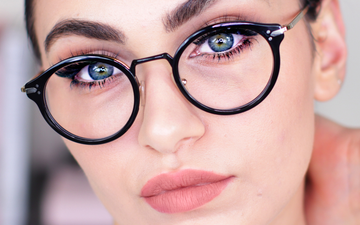Maintaining clean glasses is paramount for ensuring optimal visual clarity and prolonging the lifespan of your eyewear. Glasses are an investment, and just like any other valuable item, they require proper care and maintenance. Dust, smudges, and fingerprints can easily accumulate on the lens surface, hindering your ability to see clearly and potentially causing eye strain and discomfort. Furthermore, dirty glasses can be a breeding ground for bacteria, which may lead to skin irritation or infections, especially around the nose and eyes.
This blog post is dedicated to guiding you through the right way to clean your glasses, ensuring that you maintain crystal clear vision and keep your frames in pristine condition. We will delve into the essential tools required for the cleaning process, provide a step-by-step guide on how to clean your glasses effectively, and offer additional tips to maintain their cleanliness over time. By the end of this post, you will be equipped with the knowledge and skills needed to take proper care of your eyewear, ensuring that your glasses remain a reliable companion for your daily visual needs.

TABLE OF CONTENTS
- Step 1: The Right Tools for the Job
- Step 2: The Cleaning Process
- Step 3: Extra Tips for Maintaining Clarity
- Conclusion
step 1: The Right Tools for the Job
-
Microfiber Cloth: Describing its importance and effectiveness:
The microfiber cloth stands out due to its incredible ability to pick up and hold onto dirt, oils, and even bacteria without scratching the delicate surface of your glasses. Unlike other materials such as paper towels or cotton cloths, microfiber is composed of extremely fine fibers that are tightly woven together, creating a surface that's soft yet highly effective in trapping particles. This ensures a thorough clean without the risk of causing micro-scratches on your lenses.
Its effectiveness is not just limited to cleaning; the microfiber cloth also plays a vital role in maintaining the integrity of any protective coatings on your lenses. Where other cleaning tools might strip away these coatings over time, the gentle nature of microfiber helps to preserve them, ensuring your glasses perform at their best for as long as possible.
In addition, microfiber cloths are reusable and durable, making them an environmentally friendly and cost-effective choice for eyewear maintenance. By simply washing them regularly, you can keep them in top condition and ready for use whenever you need to give your glasses a quick polish.

-
Lens Cleaning Solution: Advising on the right type of cleaner to use:
Selecting the right lens cleaning solution is crucial to ensure that your glasses are not just clean, but also well-maintained. The ideal cleaner should be gentle, effective, and free from any harsh chemicals that could potentially damage the lenses or strip away protective coatings.
When choosing a lens cleaning solution, opt for a product that is specifically designed for eyeglasses. These solutions are formulated to break down oils and remove smudges without causing harm to the lens surface. Avoid using household cleaners, especially those containing ammonia, vinegar, or bleach, as they are too abrasive and can damage the lenses, frames, and any coatings on the lenses.
Spray-on lens cleaners are a popular choice because they are easy to use and provide an even application of the cleaning solution. Simply spray a small amount onto the lens and gently wipe it away with a microfiber cloth, ensuring that you cover the entire surface of the lens for a streak-free finish.
Some lens cleaning solutions also come with anti-fog or anti-static properties, providing additional benefits and ensuring that your glasses remain clean and clear for longer periods. When used correctly, a high-quality lens cleaning solution can help maintain the clarity of your lenses, extend their lifespan, and provide you with the best possible vision.
-
Lukewarm Water: Guiding on how to use water for cleaning:
Using lukewarm water is an effective and safe way to clean your glasses. Ensure the water is not too hot to prevent damage to the lens coatings. Simply run your glasses under a gentle stream of lukewarm water, helping to remove any loose dirt or debris. After rinsing, you can apply a small amount of gentle dish soap to further cleanse the lenses before rinsing again. Always dry your glasses with a clean microfiber cloth to avoid scratches.
step 2: The Cleaning Process
-
Rinse First: Importance of rinsing before applying any cleaning solution:
Before you apply any cleaning solution, it is imperative to rinse your glasses thoroughly. This initial rinse is crucial as it helps to remove any dust, grit, or other particles that might scratch the lenses during the cleaning process.
Use a gentle stream of lukewarm water to rinse both sides of the lenses, as well as the frame. Ensure that the water is not too hot, as excessive heat can damage the lens coatings and the frame material. This step is about preparing the glasses for a deeper cleaning, making sure that the surface is free from debris that could potentially cause harm.
By rinsing first, you are also helping to distribute the cleaning solution more evenly in the next step, which enhances its effectiveness in breaking down oils and removing smudges.
-
Apply Cleaning Solution: How to properly use lens cleaning solution:
Select a lens cleaning solution specifically designed for eyeglasses and avoid using harsh chemicals or household cleaners. Apply a small amount of the solution to each lens or directly onto a microfiber cloth. Using excessive cleaner is unnecessary and could be wasteful.
-
Gently Wipe: Techniques for wiping lenses without causing damage:
Use a soft, lint-free microfiber cloth to gently wipe the lenses in a circular motion. Start from the center and move outward, ensuring you cover the entire lens. Avoid using tissues or paper towels as they can scratch the lenses.
-
Don't Forget the Frame: Tips for cleaning the frames and nose pads:
Make sure to also clean the frames and nose pads, as they can accumulate dirt and oils. Use a small brush or a microfiber cloth to get into the crevices and remove any buildup.
-
Dry and Inspect: How to dry and inspect your glasses after cleaning:
After cleaning, gently shake off any excess water and dry the glasses with a clean, dry microfiber cloth. Inspect the lenses and frames to ensure all dirt and smudges have been removed and that there are no scratches or damage.

step 3: Extra Tips for Maintaining Clarity
-
Regular Cleaning: Creating a habit of cleaning your glasses daily:
Establishing a daily cleaning routine for your glasses can significantly contribute to maintaining their clarity and longevity. By cleaning your glasses at the end of each day, you remove the accumulation of oils, dirt, and smudges, ensuring that your vision remains clear. Make this a non-negotiable part of your nightly routine, just like brushing your teeth.
-
Proper Storage: The importance of storing glasses in a hard-shell case:
Storing your glasses in a hard-shell case when they are not in use protects them from potential damage, such as scratches, bends, or breaks. The hard case acts as a shield, preventing any hard or sharp objects from coming into contact with your glasses. Make it a habit to always place your glasses in their case whenever you are not wearing them.
-
Handle with Care: Advising on how to properly handle glasses:
Always handle your glasses with both hands to ensure an even distribution of pressure, which helps in preventing misalignment or bending of the frames. Be gentle when putting on and taking off your glasses, and make sure to grasp the frames close to where the lenses meet the arms to minimize stress on the frames.

Conclusion
Maintaining clean glasses is paramount for ensuring clear vision and prolonging the lifespan of your eyewear. Dirt, smudges, and fingerprints can significantly obstruct your sight, making it imperative to adopt a consistent cleaning routine. Daily cleaning, using the right tools and solutions, guarantees that your lenses stay pristine, enhancing your visual clarity.
Storing your glasses in a hard-shell case when not in use, and handling them with care, further contributes to their longevity and maintains their structural integrity. By ingraining these practices into your daily routine, you safeguard your investment in your eyewear and ensure that you are always seeing the world through clean, clear lenses.




